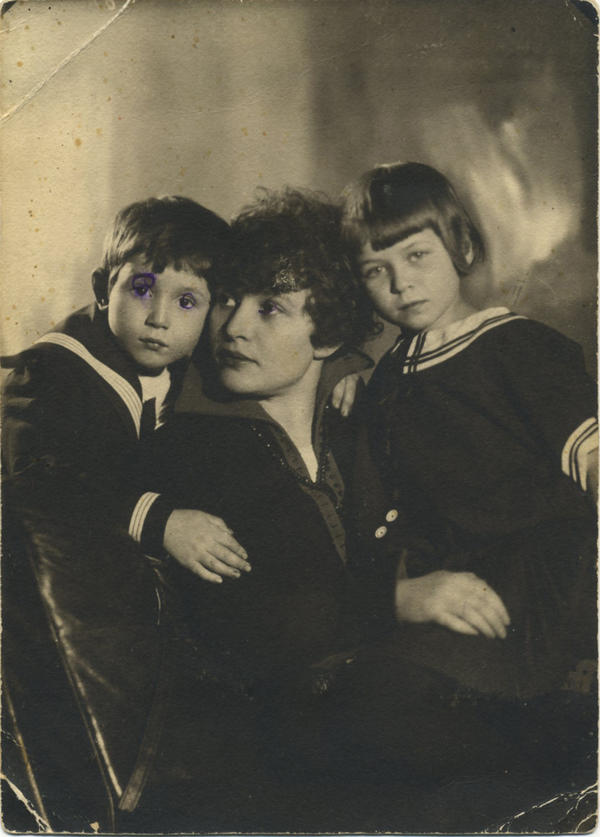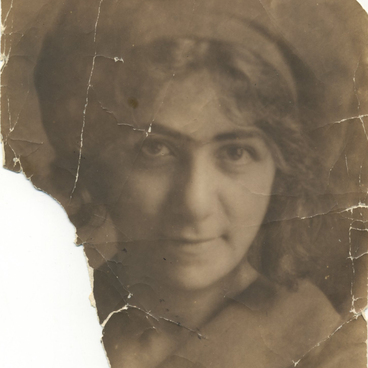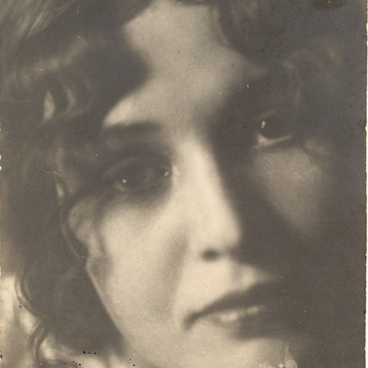Sergei Esenin and Zinaida Reikh got acquainted at the editorial office of the Delo Naroda (People’s Cause) in 1917. Their relationship flourished from the very beginning. In summer poet Alexei Ganin also enamored of Zinaida invited her and Esenin to go to the White Sea. On the way Esenin proposed marriage to the girl. As Mina Svirskaya, a friend of Zinaida, recollected: “It was somewhat of a surprise to her when aboard the ship Sergei told her that he loved her, could not live without her, and they had to get married”.
They married in the Church of Quiricus and Julietta of the Vologda Uyezd on 30 June 1917. Later, the three went to Orel to visit the parents of Zinaida. Her father recollected these events that way: “In late summer the three came to Orel. Zinaida with her husband and some flaxen-haired lad. The husband is tall, dark-haired, solid, and serious. Well, sure thing, we threw a small party… We sat for some time, had some drinks, and had a talk for a while. Night closed in. I set aside a room for newlyweds. Alas! I see that Zinaida comes to the flaxen-haired one instead of her husband. I don”t understand anything at all. The two of them go to the room set aside. Only then I realized that the husband was flaxen-haired one. And the other one is his friend? And I have to arrange a place for him”.
Soon daughter Tatiana was born. By this time, the spouses began to quarrel frequently and often lived apart.
The marriage broke up in autumn 1921. During that period Zinaida Reikh became the student of the State Experimental Theatrical Workshop, where she become close with director Vsevolod Meyerhold. They married in early 1922 and they together were bringing up the children of Zinaida and Sergei Esenin.
Konstantin Esenin, son of the poet, remembered: “First meeting with the father after prolonged absence! But for us he was just the unknown “mister”. And only nudgings of various neighbours, babysitters, both our and others’, somehow fixed the attention on ‘daddy’ … Esenin sat with us at a rectangular children’s table; he was talking mostly referring to Tanya. After the first words that were forgotten long ago, he began to ask about the game we were playing and the books we were reading… My memory kept some episodes when our father came to take a look at us with Tanya. As all young fathers, he was specially tender of daughter. Tanya was his favourite. He used to retire with her at the stairwell landing and sat on the window sill talking to her and listening her recital of verses… My father paid to me far lesser attention. In my childhood I closely resembled my mother by the face looks and hair colour. Tatiana is a blonde and Yesenin saw in her more of his features than in me’.
They married in the Church of Quiricus and Julietta of the Vologda Uyezd on 30 June 1917. Later, the three went to Orel to visit the parents of Zinaida. Her father recollected these events that way: “In late summer the three came to Orel. Zinaida with her husband and some flaxen-haired lad. The husband is tall, dark-haired, solid, and serious. Well, sure thing, we threw a small party… We sat for some time, had some drinks, and had a talk for a while. Night closed in. I set aside a room for newlyweds. Alas! I see that Zinaida comes to the flaxen-haired one instead of her husband. I don”t understand anything at all. The two of them go to the room set aside. Only then I realized that the husband was flaxen-haired one. And the other one is his friend? And I have to arrange a place for him”.
Soon daughter Tatiana was born. By this time, the spouses began to quarrel frequently and often lived apart.
The marriage broke up in autumn 1921. During that period Zinaida Reikh became the student of the State Experimental Theatrical Workshop, where she become close with director Vsevolod Meyerhold. They married in early 1922 and they together were bringing up the children of Zinaida and Sergei Esenin.
Konstantin Esenin, son of the poet, remembered: “First meeting with the father after prolonged absence! But for us he was just the unknown “mister”. And only nudgings of various neighbours, babysitters, both our and others’, somehow fixed the attention on ‘daddy’ … Esenin sat with us at a rectangular children’s table; he was talking mostly referring to Tanya. After the first words that were forgotten long ago, he began to ask about the game we were playing and the books we were reading… My memory kept some episodes when our father came to take a look at us with Tanya. As all young fathers, he was specially tender of daughter. Tanya was his favourite. He used to retire with her at the stairwell landing and sat on the window sill talking to her and listening her recital of verses… My father paid to me far lesser attention. In my childhood I closely resembled my mother by the face looks and hair colour. Tatiana is a blonde and Yesenin saw in her more of his features than in me’.
The poem ‘Letter to a Woman’ is believed to be addressed to Zinaida Reich:
My love!
I tortured you,
You had a restless look
In your tired eyes:
That I in front of you have been
Wasting myself in scandals.
But you were not aware,
That in the smoke
And in my storm-torn state
The reason why I suffer
Is that I do not know
Where we are taken by the fate…
My love!
I tortured you,
You had a restless look
In your tired eyes:
That I in front of you have been
Wasting myself in scandals.
But you were not aware,
That in the smoke
And in my storm-torn state
The reason why I suffer
Is that I do not know
Where we are taken by the fate…





